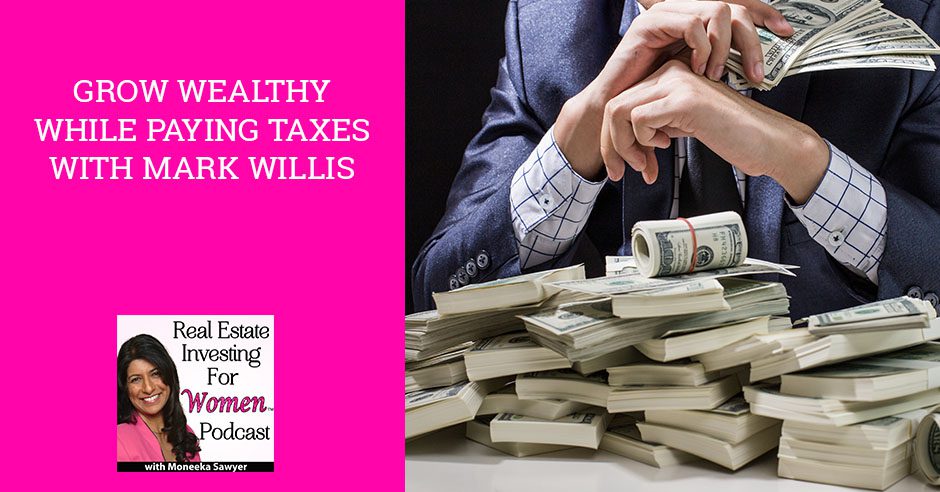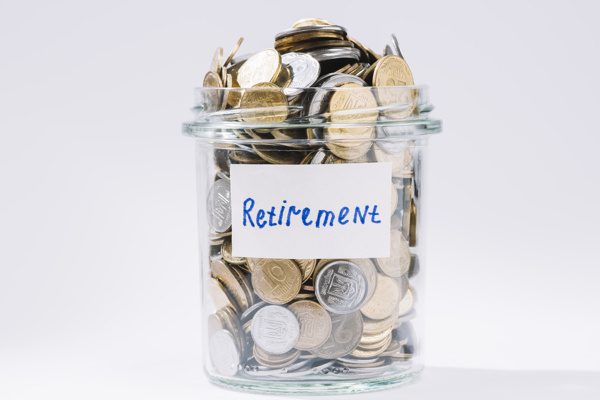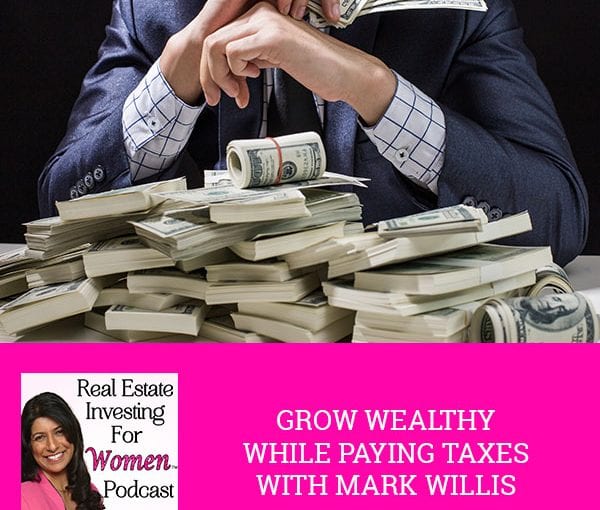Grow Wealthy While Paying Taxes With Mark Willis

Would you rather pay taxes now while you are still earning or simply want to postpone it during your later years? If Mark Willis is to be asked, he believes that it is better to pay taxes as early as possible, giving you a chance to enjoy a tax-deferred retirement. The owner of Lake Growth Financial Services sits down with Moneeka Sawyer to discuss the benefits of addressing your tax problems before it builds up and becoming a huge life obstacle. Mark also presents the Overton Window concept, emphasizing the alternative ways to pay taxes that have nothing to do with 401(k)s or IRAs.
—
Listen to the podcast here
Grow Wealthy While Paying Taxes With Mark Willis
Real Estate Investing for Women
I am excited to welcome back to the show, Mark Willis. He has been on the show several times. He’s been on our summit. He was in my book. He’s been with me a while and I’m excited to bring him back to talk about taxes. For those of you who don’t remember who Mark is, let me go ahead and reintroduce him. Mark Willis is a man on a mission to help you think differently about banks, Wall Street and financial uncertainty. After graduating with six figures of student loan debt and discovering a way to turn his debt into real wealth, as he watched everybody else lose their retirement investments and home equity in 2008, he knew that he needed to find a sane way to meet his financial objectives and those of his clients. Mark is a certified financial planner and number one bestselling author and the owner of Lake Growth Financial Services, a financial firm in Chicago, Illinois. Mike, welcome back to the show. How are you?
I am glad to be with you. I am doing great. I can’t wait to get into everything we have to cover together.
When you started talking about building wealth while paying taxes, I was all in. Let’s start by talking about tax-deferred retirement plans because that’s what people normally think is a good way to save on taxes.

Tax-Deferred Retirement: Letting the tax problem build-up is oftentimes not a good idea.
I want to start with a story. Imagine you’re a farmer out in the middle of Nowheresville, Iowa or even more beautiful, California. I have nothing against Iowa, but California is awesome. Let’s say you’re a farmer and you’re up early in the morning, as you always are. You’re getting ready for your day. You’re pouring yourself a cup of coffee, there’s a knock at the door and you open the door. It’s an IRS agent of all people. You’re puzzled, but you welcome them in. You sit them down at your dinner table, you hand them a cup of coffee and you say, “What are you doing here?” The IRS agent looks you right in the eye and says, “Moneeka, we’re going to ask you one question and we’re going to treat you according to your answer in your taxes for the rest of your professional life.”
You say, “Okay.” They say, “Here’s the question, Ms. Moneeka, do you want to be taxed on the farming seed or your harvest?” You don’t even have to hesitate. You replied by saying, “Tax me on my seed. I want a tax-free harvest.” You know the power of compounding and multiplication. You’d rather be taxed on the seed. They make a few notes. He gets up to leave and he turns around as he’s walking out the door and he says, “I’m curious, you said the seed. Why are you doing it totally backward when it comes to your retirement plans?” That’s the story. The truth is most Americans are putting money into a tax-deferred system that goes against the grain. It goes against our intuition about taxes. I’ll hush right there, but I’m curious, does that story strike anything for you as we talk about it?
Absolutely. I’ve never heard that story before, but it is true and relevant. In our retirement programs, the money is a seed. Do you want to be taxed on the seeds that go in initially or on the harvest that is worth so much more later? I’ve never heard it that way and I love it.
If you think about it, the word tax-deferred would be everything from your 401(k)s, IRAs, 457 plans and 403(b) plans. At a lot of hospitals and nonprofits, they offer 403(b). They’re all tax-deferred retirement plans, which is a postponing of what’s due. What does the word postponed mean? What does the word defer mean? It means putting off until later. Taxes are about as fun as going to the dentist, in my opinion. If you want to defer a root canal, is that a good idea? It’s not a good idea to defer a root canal and similarly, letting the tax problem build-up is oftentimes not a good idea.
I don’t know everyone’s tax situation, but over the thousands of phone calls and Zoom calls I’ve had with clients over the past decade, having quick calls and long in-depth calls, evaluating people’s tax scenarios, we have pretty sophisticated tax software that we run for our clients, but we have brief calls with people too. We asked them the question, “What do you think as you look at the nation, as you look at your personal financial situation, is our tax going to be lower or higher in the future?” Moneeka, I can’t think of a single person who’s ever said other than, “Mark, I think taxes are going to go higher in this country over my lifetime.” I tend to agree with that. It’s not a matter of political left or political right. The math party says the taxes have to go up. It’s important to ask ourselves if taxes are going to be higher and we’ve put off the tax payment. Do you want to pay those extra taxes on the money or would you rather have a tax-free harvest? That’s the looming question every person has to ask, at least if you’re a tax-paying us citizen.
There’s also something else to consider that is relevant. We’ve been trained to think that we make a ton of money. We put a bunch of way. We have our kids. We have all these expenses that happen during our life, but then when we retire, we’re going to be living on our retirement income, which is going to be significantly less than what we’re making when we’re earning money. When we start pulling that money out, we’re going to be in a lower tax bracket. Whether the taxes go up or down, regardless, we’re going to be in a lower tax bracket. I want to ask you ladies, when you retire, after however many years you put in of hard work and bringing up your family, not getting to travel and making sacrifices.
Most Americans are putting money into a tax-deferred system that goes against the grain. Share on XHopefully, you haven’t done too much of that. Hopefully, you’ve been blissful, but whatever you’ve done, do you want to be living on less than what you’re making now? I say, “No.” My retirement is not going to happen until I can live my current lifestyle or better. I want to travel more. I want to be more with my parents. I want to afford a nicer house, even if it’s a little condo penthouse. Whatever it is, I want more than this lifestyle, not less. I’m not going to work all these years for less. If you think about that, you’re deferring all of this income. You’re going to be paying taxes at the current tax bracket or higher and on more as opposed to on less.
It’s so true, Moneeka. Even if taxes are only 1% higher than they are now, on a mathematical basis, it makes more sense to pay our taxes today. I’m not telling everyone to do that, but you’re so right. Anecdotally, I can’t think of any retirees that were even moderately successful in their investments, their savings or their real estate investing who are in a lower bracket. It’s an old-fashioned myth. We’ve been living in low brackets.
It’s a marketing strategy. In the earlier days, when a lot of this stuff was developed, people were getting pensions. They were able to live on Social Security because the cost of living hadn’t increased so much. There were some fixed income things that they could count on. The average man could count on being able to retire without having to invest and without having to be financially savvy. If that in fact is true, they aren’t going to be in a lower bracket. When you start talking about a tax-deferred retirement plan, you are in a lower bracket. That’s how this whole thing started. Now in the modern day where most of us don’t have pensions. We don’t believe we’re going to be able to live off of Social Security. We are investing. We are hoping to create a lifestyle for ourselves, a retirement that we deserve and have worked for. That’s a big difference. It started as marketing. It’s just not relevant anymore.
With regard to traditional retirement plans, I have nothing against them, I just think we’re using them for the wrong thing. When I was a little kid, my parents would get on me if I was using my toys in a way that it wasn’t designed. If I was throwing my Game Boy in the bathtub, that’s not going to end well. The same is true with our financial toys or vehicles or whatever you want to call them. Everything has a place. Nothing is wrong or bad. It’s a question of what do you truly want your money to do for you. If you want your money taxed in the future, that’s great. Let’s think about it this way. Let’s say that you had somehow $1 million in your 401(k) on the day you plan to retire. You’re a 401(k) millionaire, but some or a significant portion of that money is not yours. You have a partner with you in your 401(k). It’s an equity partner you might say in your 401(k). If you tried to take $1 million out of your 401(k) after you retired, it would look suspiciously like $600,000. The $400,000 would go to the IRS.
Here’s something to keep in mind. How much of that million dollars was due as a fee to the advisor and the wrap account charges and the investment load costs baked into your 401(k). Even if you had a 1% fee, that could be as much as a third of your life savings, gone to fees over your 401(k)s lifetime according to the Department of Labor. Did the government help you with that fee? Did the IRS help support that fee since they were a partner with you in the 401(k)? Did you have to come up with the full fee by yourself? Now, the government is taking all of their money out fee-free.
By the way, while we’re talking about it, who bears the risk of that 401(k)? Did the IRS bear the risk? Did us, as citizens bear that risk of the market going down or whatever else? It’s a fool’s errand to try to beat the system when we’re using a product that was designed by the government. I’m not anti or pro any political party, but it’s important to realize that when the government creates a problem called high taxation and then creates a solution to that problem like tax-deferred retirement plans, you got to ask yourself, are you being manipulated here? That’s important to ask, especially when it comes to creating a financial life that brings bliss and brings happiness.

Tax-Deferred Retirement: Even if taxes are only 1% higher than they are now, on a mathematical basis, it makes more sense to pay taxes as soon as possible.
That is true. It is such a good tax conversation, but I’m eager to find out what we can do. Talk to me about what you got for us.
There’s something I want to chat about quickly, which is something called Overton Window. It is a cool strategy or framework for talking about things that are acceptable and unthinkable. Have you ever done Mad Libs?
Yes.
It's a question of what do you truly want your money to do for you. Share on XDon’t you love these? I love cracking up with my buddies. I don’t care if you’re 34 or 11 years old, you love a good Mad Lib. I think what makes Mad Lib’s work is we are outside of Overton Window. This is what Overton Window is. A long time ago, you could say something on the street and it would be acceptable. If you said the same thing on the street in 2020 or 2021, it would be absurd to say something that may have been so acceptable years ago. Taxes similarly have gone through a major shift in our understanding of what they’re for and what they’re there to do for us.
There’s a number of places we can put our money that still may be outside of the acceptable, what’s common, and what’s regularly thought of as their retirement savings vehicle. You teach all the time. Moneeka, about alternative ways to prepare for fiscal sanity and financial bliss that has nothing to do with 401(k)s or IRAs. They’re even older than the 401(k). The 401(k) and IRA are not even old enough to retire you yet. The first 401(k) was issued in 1981, but some of your strategies in real estate, which provide incredible tax benefits on the seed and the harvest have been around since the pyramids. Investing in real estate is as old as time itself in human civilization.
We have some cool topics and details that we will be diving deeper into, but I want to remind your awesome audience, that it’s not a shoo-in. It’s not a locked-in strategy where we must follow the guidance of the person who gave us that 401(k). You probably want to take that company match most of the time, but for all of my real cash accumulation and investing, I’m looking outside amateur retail, investment products like 401(k)s. I’m looking at things that have been more time-tested and that aren’t going to sting me when I go to get my cash out in retirement or even before retirement.
I love how you talk about that there are all these different vehicles. There are some for more the amateur investment vehicle, and then there are some more expert type vehicles. You don’t need to know a lot to become an expert, you just have to start looking at that and studying it. I agree that if you have a 401(k) that matches, you take that. We completely max out our 401(k) with my husband’s company every single year. I’m not anti 401(k) either, but it’s a piece of the puzzle. Many people depend on it as being the puzzle. We don’t want it to be the puzzle. We want it to be a piece. Real estate could be another piece. Self-directed Roth could be another piece, and your programs could be another piece. There’s a lot of different ways that we can create and that’s what you want. You want a basket of diversified ways for you to create that wealth before you retire.
In fact, you have six streams of tax-free income to diversify against any taxable income. Here are a few fun ones. You mentioned Roth accounts. That’s a great one. That’s a smart one, especially as long as the Roth exists in the tax code. It’s only been since 1997 when we’ve had Roth accounts. As long as they last, let’s take them. Another one would be some real estate that we can continue to depreciate. If your accountant hasn’t already brought up things like bonus depreciation and cost segregation, bring it up to them and be concerned that they didn’t bring it up to you first. The next thing I’d say is to look at life insurance as a stream of income in retirement. Those life insurance cash values, not term insurance, can be a safe alternative to investing that provides a tax-free income in retirement.
Some people call it the rich person’s Roth because there are fewer restrictions than a Roth account in the way of, “How much you want to contribute to it.” That sort of thing. We’re talking about things that are outside the norm of Overton Window. If you think outside the norm, let’s think about some others. If you can take only your home equity and reverse it, you can be paid by the bank tax-free to live in your house for as long as you live. This is different than the late-night reverse mortgage infomercials. I don’t always recommend these home equity conversion mortgages, but that’s something PhDs and economists like Wade Pfau have been purporting and recommending people to look into as a fourth or even fifth stream of tax-free money.
If you can splice up and diversify your tax-free streams of income, all of a sudden, the remaining 401(k) money you have, it’s good to have some tax-deferred 401(k) or IRA money, as long as we have something called the standard deduction. If your audience knows, the 2020 tax code says the standard deduction for someone married filed jointly is $24,800. As long as your taxable income is below $24,800 out of that 401(k), you can deduct it all. You could be living on six figures of income from all those streams I listed for you and still report zero taxes on your tax return every year throughout your retirement. That to me is freedom because if tax rates do go up if they go twice as high, zero times, anything is still zero. It’s a phenomenal way to live free in retirement.
Thank you for that. What intrigued me so much is talking about your system for paying taxes because all of us have to be taxes unless you’re doing what you talked about, but we all have to pay taxes. Let’s talk about this crazy idea that you have about building wealth while you’re paying taxes. I know you’re only going to be able to give us a high-level. Ladies, I want to let you know that we are setting up a webinar with Mark because I’m so intrigued by this concept and it’s relevant now. Taxes are right around the corner. I want him to give you a high-level now. We’ll give you information on webinars so he can dive deeper. We’ll have a whole hour together and he can give you a lot more information there. Go ahead and introduce us to the idea.
We’ve been talking a lot about ways to lower our taxes both now and over the lifetime, but what about what we’re still having to pay at the end of each year? If you’re a business owner or if you have a small business, oftentimes you have a big check you have to write. Let’s imagine that you could somehow write that check to yourself first and earn some growth before you pay it to Uncle Sam. We’re still paying our taxes, but what if you could build a lot of wealth of the tax bill that you have to send to the IRS? I had to send a six-figure tax bill to the IRS in 2019 and it was painful. What if you could put that money into something that you could earn interest and grow wealth on while you’re still paying your taxes? That’s the quick byline for our webinars.
We spend more on taxes than we will on our spouses. Share on XCheck out that webinar. Even if you don’t pay a whole lot or think you don’t pay a lot in taxes, I’ll give a quick story. We had a lady who came in. She was 35 years old. She was paying and we totaled it up. Her wage deductions and more were about $6,000 a year in taxes. She was making about $50,000 a year. We estimated over the next 35 years, $6,000 times 35 years of work was $210,000 for her taxes. That’s $210,000. That’s a lot of money to keep Uncle Sam happy. If she had put that $6,000 a year into a 5% interest-earning account, her money would have been an extra $500,000 at retirement that she won’t have and Uncle Sam will.
It’s important to think about how can we build wealth oftentimes, at the biggest expense of our life. I hate to even say that because we’ll spend more on our taxes than we will on our spouses. We’ll spend more on our taxes than our own children. We’ll spend more on taxes than probably any other major expense that I can imagine. The truth is taxes are a big part of each of our lives. If you could find a way to build wealth off that major payment every year, you’d be set for life without taking a bunch of unnecessary risks. That’s short and sweet of it.

Tax-Deferred Retirement: It’s an old-fashioned myth that retirees in a lower bracket are moderately successful in their investments or savings.
You had six figures, let’s say we owe $100,000 taxes. Give us a quick high-level example of how that would look.
First of all, we had a great accountant to bring that money down to as low as possible, but profits are profits and you’ve got to report them. We still had a major tax bill at the end of the year. What we decided to do was say, “We’re going to put that into a savings vehicle that we can earn some interest on.” The problem with most savings vehicles is that when you withdraw money out, it stops growing. That seems obvious. If I put money into a savings account or a CD, and then I withdraw that money out, how much interest am I now earning on that cash? Nothing. I can only earn interest slowly as I pack money up for the next tax year. I’m always faced with falling back down the staircase down to zero networth and having to build that up again, only to spend it again. It was a never-ending cycle.
What we decided to do was put it into an asset that allowed it to continue to grow, even when we access the cash to pay our tax bill. Using it as a line of credit to ourselves, essentially, we used a cash value life insurance policy designed the bank on yourself way, for the readers who want to learn more about that. We’ll be diving deep into how that works, showing real numbers on the webinar, but we use that to use as a cash source to pay our tax bill. We’ll continue to do so on every tax bill we have. It will add millions of dollars to our networth over our lifetime just by how we’re paying for our taxes. Now everyone’s numbers are going to be different, but those are our figures. You could use that same person, that 35-year-old lady who called me up. We had a Zoom call. She was floored when we saw what we could do with a similar strategy on even a nominal amount of tax every year.
This strategy is so much cooler than what Mark has been able to talk about because you get paid interest on that. You don’t have to pay back that money. There are different ways to do this so that you can maximize the wealth that you’re building while you pay your taxes each year. I’m amazed.
Let’s expand it to real estate. You can do the same with your real estate. You can do the same with your own major purchases like vehicles. Any major purchase, including taxes, this fits as long as you’ve sat down with a competent professional to look at it first. You don’t want to just jump into this half-blind, but you can take back control of that money. It’s a tax-free income stream under current law alongside Roth IRAs and other accounts. It’s a phenomenal change in the mindset of how we make our major purchases.
I’m excited about the webinar. Let’s give them a brief and rundown on what that’s going to look like. First of all, the webinar is going to be on January 21st, 2021 which is a Thursday. We’re going to be doing it from 1:00 to 2:30 Pacific time. To get signed up for that webinar, you go to BlissfulInvestor.com/Mark. Tell us a little bit about what we’re going to be covering in that.
By building wealth off your taxes every year, you'd be set for life without taking a bunch of unnecessary risks. Share on XWe’re going to have some specific ways in which you can lower your tax bill without building up a taxable time bomb in the future. We’re going to be talking about ways on how you can specify as a business owner or someone who’s got a day job, find some incredible tax gaps in the current code to take advantage of for yourself, paying what’s due of course, but never leaving the tax man a tip. That’s my mantra. Also, finding some specific ways you can use the strategy we described to build real wealth on your tax bill and all your other major purchases too. We’ll even be showing some real case studies and examples, and then a chance to see how we can even pull out of this asset a tax-free income stream that will last as long as you do.
I love that. Ladies, the reason that I asked Mark to do this webinar specifically was that two of you called me or emailed me and let me know that you did join up with Mark or Amanda Neely in the past. The whole infinite investing idea is real and you’re discovering how to use it and you love it. I have some other mentors of mine that are also working with Mark like Chris Prefontaine, who you guys also know. There are some people that I trust are working with Mark on this strategy. There are some of you ladies that have given me feedback that this is amazing and you love it.
I wanted to highlight it for the rest of you to see how you might be able to utilize it for yourself. That’s why we’re doing this webinar. I think it’s going to be valuable. Go sign up. It’s going to be at BlissfulInvestor.com/Mark. If you sign up and you can’t make it, he will send a replay out for you ladies. The other thing is if you feel like you would rather speak to Mark and not go to the webinar, you’re already sold, he’s going to give you his calendar link. How can they do that?
If you go to LakeGrowth.com/schedule and then mention Moneeka in the calendar link when you fill out the appointment schedule and you’re setting your time. It’s a fifteen-minute phone call or Zoom call. We would be happy to answer your questions. If you can’t wait for the webinar and want to get right to the answers, I would be happy to schedule that with you right away, but make sure to mention Moneeka in the appointment that you sent. I would be happy to send you a free copy of the chapter that Moneeka and I co-authored together and the awesome book, Real Estate Investing for Women, which was so fun to write. Thank you Moneeka again for the opportunity.
For the people who want to be on that calendar before the webinar, I’d be happy to chat with you guys. I don’t know if this is too much to say, Moneeka, but it may even be that those that attend the webinar get that chapter as well. I’ll leave that up to you to decide, but I want to get this information out to people. I think it will be so much fun. I can’t wait to be there with your readers and your audience again. You’ve got the greatest people in the world.

Tax-Deferred Retirement: If your accountant hasn’t already brought up things like bonus depreciation and cost segregation, be concerned that they didn’t bring it up to you first.
Thank you. I think so too. I love my ladies. We’ll get some time to go through it. We go high level. It’s pretty quick because not everybody’s interested. For those of you who are interested, we’ll get some good time to deep dive. I’ve scheduled for 90 minutes so we have that commitment on our calendar. We can go through the webinar, ask questions and that sort of thing. Ladies, come join Mark and me on January 21st, 2021 which is a Thursday from 1:00 to 2:30 PM Pacific Time and go to BlissfulInvestor.com/Mark. Mark, this has been amazing. Thank you so much for sharing this time with us again.
You’re such a giving person, Moneeka, thank you for what you give to the world, and keep up the great work. We appreciate you.
Thank you. Ladies, thank you for joining Mark and I for this portion of the show. We look forward to seeing you next time. Until then, always remember, goals without action are just dreams. Get out there, take action, and create the life your heart deeply desires. I see you soon.
Important Links
- Lake Growth Financial Services
- BlissfulInvestor.com/Mark
- LakeGrowth.com/schedule
- Real Estate Investing for Women
Love the show? Subscribe, rate, review, and share!
Join the Real Estate Investing for Women Community today:
________________________________________________________________________
To listen to the EXTRA portion of this show go to RealEstateInvestingForWomenExtra.com
To see this program in the video:
Search on Roku for Real Estate Investing 4 Women or go to this link: https://blissfulinvestor.com/biroku
On YouTube go to Real Estate Investing for Women
——————————————————
Learn how to create a consistent income stream by only working 5 hours a month on the Blissful Investor Way.
Grab my FREE guide at http://www.BlissfulInvestor.com
Moneeka Sawyer is often described as one of the most blissful people you will ever meet. She has been investing in Real Estate for over 20 years, so has been through all the different cycles of the market. Still, she has turned $10,000 into over $5,000,000, working only 5-10 hours per MONTH with very little stress.
While building her multi-million dollar business, she has traveled to over 55 countries, dances every single day, supports causes that are important to her, and spends lots of time with her husband of over 20 years.
She is the international best-selling author of the multiple award-winning books “Choose Bliss: The Power and Practice of Joy and Contentment” and “Real Estate Investing for Women: Expert Conversations to Increase Wealth and Happiness the Blissful Way.”
Moneeka has been featured on stages including Carnegie Hall and Nasdaq, radio, podcasts such as Achieve Your Goals with Hal Elrod, and TV stations including ABC, CBS, FOX, and the CW, impacting over 150 million people.

